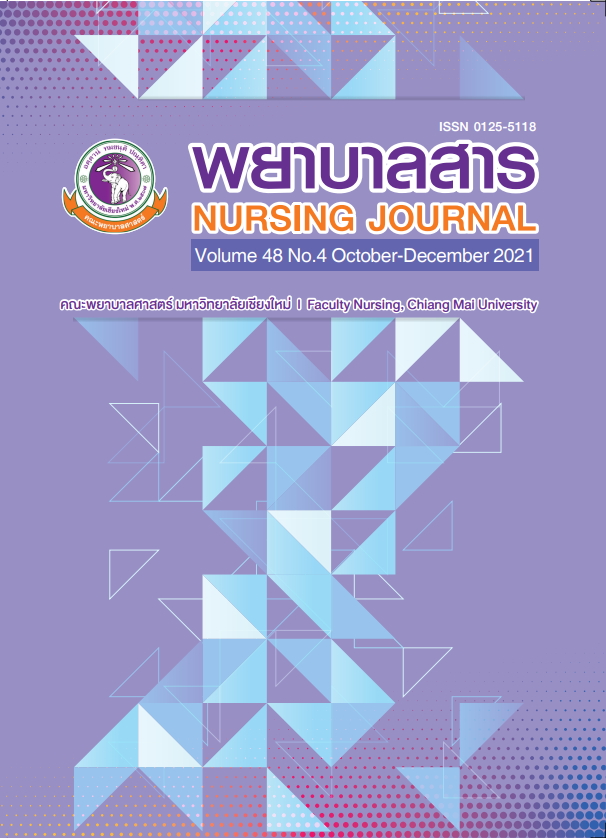Religious Practices and Spiritual Well-being in Older Persons with Uncontrolled Hypertension
Keywords:
spiritual well-being, religious practices, older persons with uncontrolled hypertensionAbstract
Uncontrolled hypertension is a major health problem that lead to serious complications in older persons. It affects the soul leading to feelings of guilt, grief, and anxiety, and spiritual support is vital in the face of chronic disease. Religious practices promote spiritual well-being. This correlational descriptive research aimed to describe spiritual well-being, religious practices, and the relationship between religious practices and spiritual well-being among older persons with uncontrolled hypertension. Participants were older persons with uncontrolled hypertension who received treatment at Ban Si Bun Rueang, Thambon Nong Hoi, Health Promotion Hospital, and Suthep Sub District Public Health Service Center, Chiang Mai province. The 88 participants were selected using convenience sampling. The research tools used in this study were a Demographic Data Recording Form, the Thai Spiritual Well-Being Assessment Tool for Elders with a Chronic Illness (TSWBATECI) and Buddhist Practices Scales. Data were analyzed using descriptive statistics and Pearson’s Correlation Coefficient. The results showed that the participant’s spiritual well-being and religious practices were at a high level. Religious practices had a positive relationship with spiritual well-being at a moderate level with a statistical significance of .01 (r=0.30). The results are useful for health care providers in promoting religious practices and spiritual well-being in older persons with uncontrolled hypertension.
References
Apinanmahakul, A. (2012). Thai society and religious donations and activities. Faculty of Economic Development National Institute of Development Administration. (in Thai)
Arampharat, P. (2013). People's participation in Buddhist activities, case study, Thawi Watthana District, Bangkok Province. Veridian E-Journal, 6(1). 457-478.
Bhanthumnavin, D. (1997). Buddhist beliefs and practices of Thai people: Cultivation, training and quality of life. Bangkok: National Institute of Development Administration. (in Thai)
Boonruangrat, C. (2008). Spiritual well-being and happiness of the elderly in the Center for
the Development of Social Welfare for the Elderly at Ban Bang Khae. Bangkok:
Chulalongkorn University. (in Thai)
Bureau of Epidemiology, Department of Disease Control, Ministry of Public Health. (2012). Report on the Surveillance of Chronic Non-Communicable Diseases, 2012. Chronic Disease Surveillance Report, 2012. Retrieved from http://www.boe. moph.go.th /files/report/20140109_40197220.pdf
Burn, N., & Grove, S. K. (2009). The practice of nursing research: Conduct, critique & utilization (5th ed.). Philadelphia: Elsevier.
Calhoun, D. A., Jones, D., Textor, S., Goff, D. C., Murphy, T. P., Toto, R. D., ... Ferdinand, K. (2008). Resistant hypertension: diagnosis, evaluation, and treatment a scientific statement from the American Heart Association Professional Education Committee of the Council for High Blood Pressure Research. Hypertension, 51(6), 1403-1419.
Chaichanavirot, U. (2000). Relationships between family relationships, Health status, meditation practice and spiritual well-being of the elderly (Unpublished master’s thesis). Burapha University, Thailand. (in Thai)
Chiang Mai Provincial Public Health Office. (2016). Developing a chronic non-communicable disease service system in 2016. (in Thai) Retrieved from http://www.chiangmaihealth.go.th/cmpho_web/
Edmondson, K. A., Lawler, K. A., Jobe, R. L., Younger, J. W., Piferi, R. L., & Jones, W. H. (2005). Spirituality predicts health and cardiovascular responses to stress in young adult women. Journal of Religion and Health, 44(2), 161-171.
Hypertension Association of Thailand. (2012). Guidelines for the treatment of hypertension in general practice, B.E. 2012 (1st ed.). Bangkok: Hua Nam Printing.
Kahn, R. L., Goldfarb, A. I., Pollack, M., & Peck, A. (1960). Brief objective measures for the determination of mental status in the aged. American Journal of Psychiatry, 117(4), 326-328.
Kanthamun, N. (2003). Spiritual well-being of the elderly with lung cancer (Unpublished master’s thesis). Chiang Mai University, Thailand. (in Thai)
Kretchy, I. A., Owusu-Daaku, F. T., & Danquah, S. A. (2014). Mental health in hypertension: Assessing symptoms of anxiety, depression and stress on anti-hypertensive medication adherence. International Journal of Mental Health Systems, 8(1), 1-6.
Kwanyuen, N. (2008). Religious activities of Buddhist immigrants in Urban Areas: A community case study. one in Bangkok (Unpublished master’s thesis). Chandrakasem Rajabhat University, Thailand. (in Thai)
National Health Commission Office. (2007). Clinical practice guideline diabetes, high blood pressure chronic obstructive pulmonary disease. Retrieved from https://www.nationalhealth.or.th/index.php/en/node/1407
Noipiang, T. (2001) Perceived severity of illness, social support and well-being psychology in breast cancer patients (Unpublished master’s thesis). Chiang Mai University, Thailand. (in Thai)
Nwankwo, T., Yoon, S. S., Burt, V., & Gu, Q. (2013). Hypertension among adults in the United States: National Health and Nutrition Examination Survey, 2011-2012. NCHS data brief, 133, 1-8.
O’Brien, M. E. (2008). Spirituality in nursing: Standing on Holy Ground. Philadelphia: Jones and Bartlett.
Praiwan, C. (1997). Relationships between personal factors, religious practices, nursing caring behaviors, and spiritual welll-being of aids patients in Bumrasnaradura Hospital. Bangkok: Chulalongkorn University. (in Thai)
Puchalski, C. M. (2001). The role of spirituality in health care. Proceedings Baylor University. Medical Center, 14(4), 352. (in Thai)
Rakhab, A., Thaniwattananon, P., Nilmanat, K., & Apichato,A. (2007). Practicing dharma. perceived health status and hope in people living with HIV. Songklanagarind Medical Journal, 25(4), 259-271. (in Thai)
Rujipairote, P. (2007). The relationship between spiritual well-being, social support and perceived severity of illness and mental health self-care behaviors in breast cancer patients (Unpublished master’s thesis). Mahidol University, Thailand. (in Thai)
Somdet Phra Yannasangwon Patriarch Sakol Maha Sangkha Parinayok. (2013). Methods for creating merit. (in Thai) Retrieved from http://www.openbase.in.th/files/ebook/
sangh/set5/sangharajad019.pdf
Soowit, B., Panasakulkan, S., & Muksiritipanun, B. (2015). The assessment of the suffering
symptoms in palliative care patients. Songklanagarind Journal of Nursing, 35(1), 153-164. (in Thai)
Tantitrakul, W. (2009). Factors related to spiritual well-being of terminally ill cancer patients. Journal of Thai Traditional and Alternative Medicine, 2(3), 27-35. (in Thai)
Unsanit, P., Sunsern, R., Kunsongkeit, W., O’Brien, M. E., & McMullen, P. C. (2012). Development and evaluation of the Thai Spiritual Well-Being Assessment Tool for elders with a chronic illness. Pacific Rim International Journal of Nursing Research, 16(1), 13-28.
Wiangchai, P. (2015). Physiological response to stress. (in Thai) Retrieved from http://biology. ipst.ac.th/ ?p=2767
World Health Organization. (2013). Health services-statistics. Retrieved from www.who.int/ research/en
Downloads
Published
How to Cite
Issue
Section
License
บทความที่ได้รับการตีพิมพ์เป็นลิขสิทธิ์ของวารสารพยาบาลสาร
ข้อความที่ปรากฏในบทความแต่ละเรื่องในวารสารวิชาการเล่มนี้เป็นความคิดเห็นส่วนตัวของผู้เขียนแต่ละท่านไม่เกี่ยวข้องกับมหาวิทยาลัยเชียงใหม่ และคณาจารย์ท่านอื่นๆในมหาวิทยาลัยฯ แต่อย่างใด ความรับผิดชอบองค์ประกอบทั้งหมดของบทความแต่ละเรื่องเป็นของผู้เขียนแต่ละท่าน หากมีความผิดพลาดใด ๆ ผู้เขียนแต่ละท่านจะรับผิดชอบบทความของตนเองแต่ผู้เดียว






